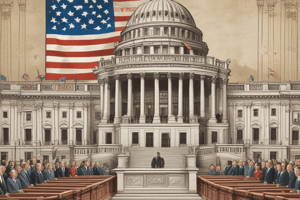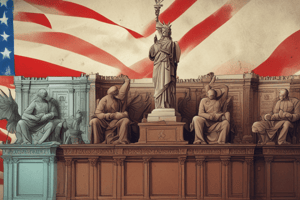Podcast
Questions and Answers
What is the role of the executive in a government?
What is the role of the executive in a government?
- Interpreting laws
- Enforcing laws (correct)
- Passing laws
- Advising the judiciary
Why does the Constitution separate the powers of different branches of government?
Why does the Constitution separate the powers of different branches of government?
- To ensure a balance of power (correct)
- To prevent elections
- To allow the executive to become stronger
- To increase the judiciary's power
What does the term 'State' refer to in this context?
What does the term 'State' refer to in this context?
- System of courts
- Sovereign people occupying territory (correct)
- State governments
- Democratic institutions
Why were members of the Constituent Assembly concerned about the executive becoming too strong?
Why were members of the Constituent Assembly concerned about the executive becoming too strong?
What distinguishes a State from a government?
What distinguishes a State from a government?
What is the primary function of the judiciary in a country?
What is the primary function of the judiciary in a country?
Why is a Constitution important in a democratic country?
Why is a Constitution important in a democratic country?
What is the difference in who exercises Executive Power in the 1990 and 2015 Constitutions of Nepal?
What is the difference in who exercises Executive Power in the 1990 and 2015 Constitutions of Nepal?
What is a possible consequence if elected representatives had unlimited power?
What is a possible consequence if elected representatives had unlimited power?
In a class of 50 students, 40 belong to more well-off families. Who represents the minority in this situation?
In a class of 50 students, 40 belong to more well-off families. Who represents the minority in this situation?
What is the significance of respecting minority views in a democratic setup?
What is the significance of respecting minority views in a democratic setup?
Which of the following is a primary function of a Constitution in a democratic country?
Which of the following is a primary function of a Constitution in a democratic country?
What is the significance of the separation of powers in a democratic country?
What is the significance of the separation of powers in a democratic country?
How does federalism in India differ from a unitary system of government?
How does federalism in India differ from a unitary system of government?
Why is universal adult suffrage considered important in a democracy?
Why is universal adult suffrage considered important in a democracy?
What role did the Constituent Assembly play in the establishment of India's Constitution?
What role did the Constituent Assembly play in the establishment of India's Constitution?
How are representatives in a democratic system held accountable?
How are representatives in a democratic system held accountable?
What is the primary function of the executive branch in a democratic government?
What is the primary function of the executive branch in a democratic government?
Flashcards are hidden until you start studying
Study Notes
The Three Organs of Government
- The executive is responsible for implementing laws and running the government.
- The judiciary refers to the system of courts in the country.
- The Constitution ensures that each organ exercises different powers to prevent the misuse of power and maintain a balance of power.
The Difference between State and Government
- The term 'State' refers to a political institution that represents a sovereign people who occupy a definite territory.
- The State has a democratic form of government, but the government can change with elections.
- The State refers to more than just the government and cannot be used interchangeably with it.
Importance of a Constitution
- A democratic country needs a Constitution to prevent the misuse of power by any one branch of government.
- The Constitution ensures that each organ of government acts as a check on the other organs.
Key Features of the Indian Constitution
- Federalism: States are not merely agents of the federal government but draw their authority from the Constitution.
- All persons in India are governed by laws and policies made by each of the three levels of government.
- Parliamentary Form of Government: The government consists of representatives who are elected by the people.
- Universal Adult Suffrage: The Constitution guarantees the right to vote for all citizens.
- Separation of Powers: The three organs of government - legislature, executive, and judiciary - have different powers.
The Importance of Respect for the Minority
- In a democratic setup, it is essential to respect the views of the minority to ensure their rights and interests are protected.
- Reasons for respecting the minority vary depending on the situation, but it is crucial to ensure their voices are heard.
Studying That Suits You
Use AI to generate personalized quizzes and flashcards to suit your learning preferences.




